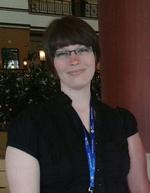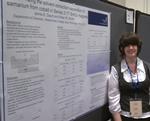Posted on Friday, April 13, 2012
Four Westminster College chemistry and biochemistry majors presented their research at the American Chemical Society (ACS) national meeting March 25-29 in San Diego.
Biochemistry major Hannah Anderson presented "Microwave-Assisted Hydrothermal Synthesis of Lutetium Oxyorthosilicate (LSO)," research conducted under the supervision of Dr. Peter Smith, Westminster associate professor of chemistry.
LSO is the most common detector used in PET scans, a type of nuclear medical imaging used to produce three-dimensional structure of certain biological processes in the body. The current method of producing LSO is time-consuming and requires a significant amount of energy. Two alternate methods, one using microwave energy and one using conventional heating, have been proposed to provide more energy-efficient options for synthesizing LSO.
The project involved synthesizing samples using both alternate methods to determine any structural differences in the LSO produced by the two methods, using powder x-ray diffraction for analysis.
Anderson is a daughter of Mark and Barbara Anderson of Tarentum and a graduate of Oakland Catholic High School.
Chemistry major Ashley Blystone gave an oral presentation on "Quantification of 4-ethylphenol in Belgian-Style Beers Using GC-MS Analysis" as part of the Agriculture and Food Chemistry Symposium. The research was conducted under the supervision of Dr. Sarah Kennedy, assistant professor of chemistry. Dr. Helen Boylan, associate professor of chemistry, and senior biochemistry major Justin Jones contributed to the project.
Brettanomyces is a yeast used to brew certain styles of Belgian beers. It produces 4-ethylphenol, a compound that can spoil wine but contributes to the overall flavor profile of the beer. Blystone's research quantified the compound using gas chromatography-mass spectrometry.
"The biggest advantage to attending is gaining the ‘real world' experience of seeing what others in your field are accomplishing," Blystone said.
In addition to her presentation, Blystone serves on the ACS Younger Chemists Committee that focuses on serving the needs of both the younger society members and of those who may be young in their careers.
Blystone is a daughter or Brian and Jessica Blystone of Ford City and a graduate of Ford City High School.
Chemistry major Jaimie Daum presented a poster on "Optimizing the Solvent Extraction Separation of Samarium from Cobalt in Series 2:17 SmCo Magnets." The research was advised by Smith.
Samarium-cobalt magnets are very brittle and less powerful than neodymium magnets but are resistant to demagnetization by external magnetic fields. The goal of the research was to optimize the separation of rare earth metal elements found in series 2:17 samarium-cobalt magnets (two atoms of samarium and 13-17 atoms of transition metals, mostly cobalt atoms).
"The meeting and exposition exceeded all of my expectations," Daum said. "Current research in numerous chemical fields was presented by professionals as well as students, providing a great opportunity for networking."
Daum is a daughter of Warren and Darby Daum of Butler and a graduate of Butler Area High School.
Biochemistry major Katie Farley presented "Understanding Wine Contamination by Studying a New Brettanomyces Recombinant Enzyme." Kennedy was the faculty adviser.
Previous studies showed that a wild yeast protein contaminates wine, causing an unpleasant odor, but the structure of the protein has not been characterized, leaving the mechanism of contamination a mystery. In the past year, Farley and Kennedy have cloned the protein and purified it. They are working now to solve its structure to explain the mystery of the wine contamination.
Farley is a daughter of Robert Farley of Bangor and Stephanie Farley of Belvidere, N.J., and a graduate of Bangor Area High School.
Contact Kennedy at (724) 946-7294 or email for additional information.
The students received national meeting travel grants from the ACS, as well as travel/presentation grants from Westminster's Drinko Center for Experiential Learning.
The Drinko Center for Experiential Learning was created to enrich undergraduate education at Westminster through advancing world-class teaching as well as by participating in collaborations that address community and regional needs including strengthening K-12 education. The Undergraduate Research Initiative provides funding for students to conduct research and to present their research at regional and national conferences. Visit the Drinko website for more information about the Drinko Center and its programs.

